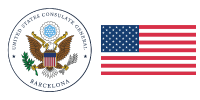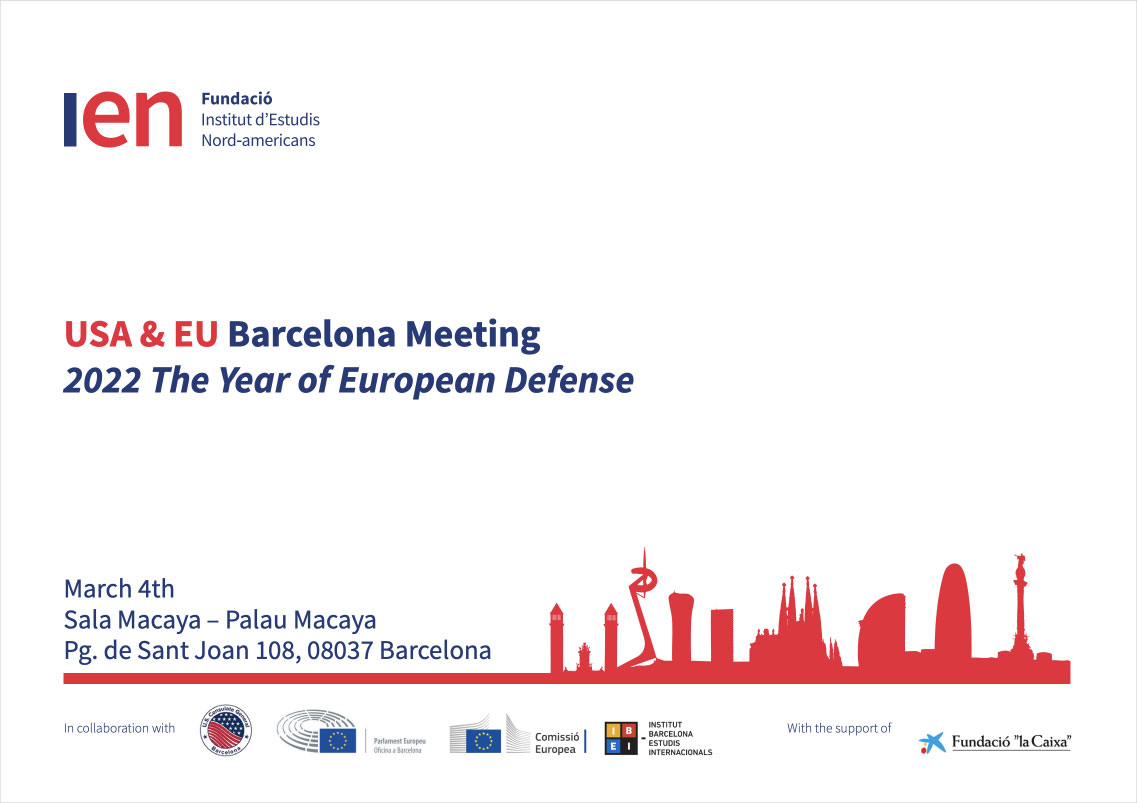USA & EU Barcelona Meeting
2022 The Year of European Defense
March 4th / 10.00 am – 1.15 pm
The first day of the USA & EU Barcelona Meeting Agenda will debate on the defense systems of the European Union and NATO
This March, the Institut d’Estudis Nord-americans began its USA & EU Barcelona meeting program, the annual cycle of days in which the foundation seeks to delve into different aspects of current transatlantic relations. A day was held entitled 2022: the year of European defense, dedicated entirely to discussing European defense and what course must be plotted by the European Union and NATO in the face of a context conditioned by multiple elements: from the confrontation between Russia and the Ukraine, enormous challenges in Afghanistan and the rise of China, as well as aspects such as the impact of climate change and the growing number of cyberattacks. During the day, held at Barcelona’s Palau Macaya, several expert speakers took part in two roundtable debates addressing the balancing of the priorities of Europe and the United States within ONATO and the strategic autonomy of Europe.
Joan F. Corona, president of the Institut d’Estudis Nord-americans Foundation, provided the opening speech of the day, thanking all those in attendance and emphasizing the relevance that of the year’s selected topic in light of the recent events that occurred between Russia and the Ukraine. The same sentiment was expressed by Katie Stana, the United States Consul General in Barcelona, in here welcoming speech, during which she assured that the situation in the Ukraine was a threat to European security, but also a fact that demonstrated the great importance of bodies such as NATO in the defense of democracy and the preservation of human rights. The last of the opening speeches was by Olivier Ramadour, France’s Consul General in Barcelona, and also referred to the crisis between Russia and the Ukraine, affirming that efforts must be made to ensure the security of Europe. The day was conducted and moderated by Carme Colomina, Chair of the Associació de Periodistes Europeus de Catalunya (APEC – European Journalists of Catalonia Association) and the CIDOB’s principal researcher specialized in the EU, disinformation and global politics.
The balance of priorities within NATO
The first roundtable debate was entitled NATO’s eighth strategic concept: balancing the priorities of Europe and the USA included the participation of Jeffrey Michaels, senior researcher of the IEN, specialized in American foreign policy and international security; Tom Vandenkendelaere, chairman of the European Parliament’s delegation to the NATO Parliamentary Assembly; and Lukas Milevski, professor of International Studies at the University of Leiden. To introduce the subject, Jeffrey Michaels laid out the historical context from 2010 to today, indicating the involvement of NATO in Afghanistan, the annexation of Crimea by Russia and the most recent developments in the Ukraine by that same power, which have defined the most important actors to take into account when designing the defense systems of Europe and NATO. “If Ukraine ends up being invaded by Russia, NATO will have to redraw it defense strategy since the borders will have changed,” he explained. “The same thing would happen if Finland decided to join the alliance, since NATO would gain 300 new kilometers of border with Russia“he added.
During his presentation, Tom Vandenkendelaere defined NATO as one of the great pillars of international security and affirmed that the stronger Europe’s defense is, the stronger the alliance will be. He then reminded us that the cooperation between the European Union and NATO is fundamental in the definition of a future defense strategy that is able to face growing challenges, such as cyberattacks and the defense of democracy and the international order. “Specifically, the two bodies would have to cooperate on priorities in order to guarantee European security, as well as reinforce their military capacity, counteract destabilizing interference, and work in a coordinated manner to guarantee international order,” he noted. In this regard, he indicated the strategic need to improve collaboration between the two bodies. “Despite both having their headquarters in Brussels less than 2 kilometers apart, the political distance that separates them is still quite large,” he opined.
In his turn, Lukas Milevski addressed the question of European defense from the point of view of the Baltics and reaffirmed that, while there is consensus between nations in defining Russia as a threat, there should be a discussion regarding what relationship we should have with China. Furthermore, because of the outbreak of conflict between Russia and Ukraine, Milevski urged the European Union to support NATO. “From the Baltic perspective, we are very concerned with finding out what long term effects this crisis could have in terms of Eastern European territories, who will have to live alongside a threat like Russia,” he explained.
Europe’s level of strategic ambition
The second roundtable debate instead focused on the strategic autonomy that the European Union has exercised in recent years. The debate entitled Europe’s level of strategic ambition: goals, capabilities, and cooperation, saw the intervention of speakers, Francisco Ruiz González, professor of the Institut Universitari General Gutiérrez Mellado of UNED; Joanneke Balfoort, director of Security and Defence Policy of the European External Action Service; and Theresa Fallon, director of CREAS – Center of Russian, European, and Asian Studies, as well as a senior non-resident member of the Chicago Council on Global Affairs. The person in charge of kicking off the debate was Francisco Ruiz, who gave a detailed X-ray of the European Union’s level of military and strategic ambition from 1999 to the present day. He also recorded those present that the European Union is currently working on the development of The Strategic Compass for the EU, which would define four primordial aspects for the security of the territory: crisis management, resilience, capacities, and associations. He then reminded us that within the European Union itself there are different perceptions of threats and dissimilar cultures of defense. He went on to say that while it is often difficult to find the lowest common denominator, but that we must work to preserve and strengthen the transatlantic connection.
Along the same lines, Joanneke Balfoort emphasized the need to increase cooperation between NATO and the European Union in order to prepare for the new challenges that have recently appeared, such as cyberattacks or hybrid warfare. We have to join forces with our allies, walk together, avoid at all costs any possible fragmentation,” he specified. For Balfoort, it is necessary, “to rethink how security is managed in Europe, specifically after had experienced risks and dangers that we never thought we would have to face,” in reference to the conflict between Russia and Ukraine.
Finally, Theresa Fallon emphasized the increase in relations and dialogue between the European Union and NATO that has resulted from the crisis in Ukraine. “The conflict has made many things change,” she noted. “In less than a week, for example, we have seen how countries that have always been neutral, such as Switzerland and Sweden, have begun weapons exports,” she explained. Taking a wider geopolitical tack, Fallon highlighted the common wavelength of Russia and China and the link it creates between them, focusing much of her talk on analyzing the degree of dependence countries from the European Union, such as Germany, have on Russia. In regards to this, she noted that we must move towards a diversification of energy sources in order to help reduce this level of dependence.
The days came to a close with a speech by Javier Solana, President of ESADE’s Center for Global Economy and Geopolitics, senior representative of the European Union’s Common Foreign and Security Policy Council, and former NATO Secretary General. In his speech, Solana reflected on three questions: what direction should NATO take, how should it be reorganized, and how should the defense of the European Union be restructured? From there, he went on to vindicate the need to strengthen ties of collaboration and coordination between the two bodies.
Panel 1.
NATO’s Eighth Strategic Concept: Balancing US and European Priorities
In the coming months, as NATO officials continue to draft the Alliance’s latest Strategic Concept, what substantive changes, if any, are we likely to see in the new document? Although in recent years NATO has balanced dealing with the threat from Russia on an equal level with terrorism and instability on Europe’s southern periphery, will China now be elevated to the same level? Or will Russia’s recent belligerence toward Ukraine force the Alliance to remain focused on its Eastern Flank for years to come? Will the Alliance continue to expand its membership and tasks, or is it set to decline in importance relative to the EU? With a possible change in the U.S. administration in 2025, how confident are non-US allies that America is likely to remain committed to European defense?
Topic presentation
Dr. Jeffrey Michaels
IEN Senior Fellow in American Foreign Policy and International Security, Institut Barcelona d’Estudis Internacionals (IBEI)
Speakers
Mr. Tom Vandenkendelaere
Chair, Delegation for relations with the NATO Parliamentary Assembly, European Parliament
Dr. Lukas Milevski
Lecturer in International Studies, Leiden University
Panel 2.
Europe’s Strategic Level of Ambition: Objectives, Capabilities and Cooperation
After years of dithering about the EU’s role on the world stage, particularly the extent to which it exercises ‘strategic autonomy’, there is a growing determination among European leaders to finally establish a clear direction for the future. In particular, lack of clarity about the EU’s military ‘level of ambition’ has undermined efforts by the EU to become more assertive in the defense field. But will the forthcoming summit be able to achieve a positive consensus, or will longstanding impediments continue to hamper the prospect of new initiatives? Will the de facto division of labor between the EU and NATO continue when it comes to territorial defense versus conducting smaller-scale expeditionary operations? To what extent will the EU cooperate with the United States on defense matters outside the NATO framework?
Topic presentation
Dr. Francisco Ruiz González
Professor at the General Gutiérrez Mellado University Institute of the UNED
Speakers
Ms. Joanneke Balfoort
Director, Security and Defence Policy, European External Action Service
Ms. Theresa Fallon
Director, Centre for Russia, Europe, Asia Studies (CREAS) / Nonresident Senior Fellow Chicago Council on Global Affairs
Moderator
Dr. Carme Colomina
Research Fellow on European Union, disinformation and global politics at Barcelona Centre for International Affairs (CIDOB)
Closing Remarks
Sr. Javier Solana, President of EsadeGeo Center for Global Economy and Geopolitics. Former European Union High Representative for the Common Foreign and Security Policy and Former Secretary General of NATO
Academic advisor: Dr Jeffrey Michaels, IEN Senior Fellow in American Foreign Policy and International Security, Institut Barcelona d’Estudis Internacionals (IBEI)
Where will it be held?
Sala Macaya – Palau Macaya
Passeig de Sant Joan, 108, 08037 Barcelona
Languages
Simultaneous interpretation will be included.
Communication
The media will be informed of expert visits
The event will not be streamed but will be filmed to edit a short portion to be posted on the IEN website
In collaboration with:




Supported by:

